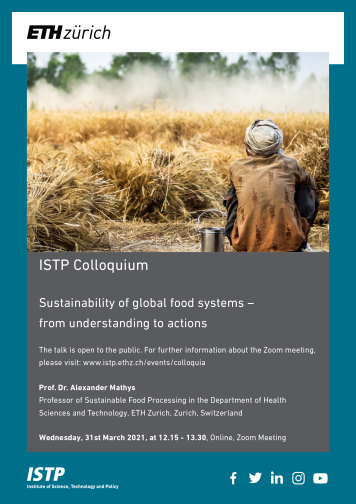Colloquium: Prof. Alexander Mathys
Wednesday, 31st March 2021, at 12.15 - 13.30
Online, Zoom | Sign up here
Sustainability of global food systems – from understanding to actions

Food systems are at the heart of at least 12 of the 17 Sustainable Development Goals (SDGs). The wide scope of the SDGs calls for holistic approaches that integrate ‘siloed’ food sustainability assessments in order to develop solutions able to change complex food systems. Despite numerous developed solutions the problems associated with the excessive use of natural resources for food production and food waste are not solved. Such problems are considered as one of the most crucial for our global food systems and sustainable development.
The alliance of novel production technologies with integrated sustainability assessment in real time and further data integration into national food systems through nutritional, environmental and social indicators could be a basis for the holistic development of more sustainable food systems. For emerging production systems, holistic life cycle sustainability assessment, aligned with introduced process innovations, can evaluate the suggested solutions on a multi parameter base, in terms of sustainability of improved food production. Life Cycle Sustainability Assessment (LCSA) in this perspective could potentially evaluate all environmental, social and economic impacts and benefits in the context of decision-making processes towards the development of sustainable products throughout their life cycle, if holistic data sets would be available. The integration of advanced sustainability assessment with nutritional properties can provide new assessments of the real value of innovative food products enabled by emerging production technologies. This allows for an improved and fair comparison between new food products against other sources, taking into consideration the respective technology readiness levels of new production processes and their economy of scale. Environmental Life Cycle Assessment (LCA) as part of LCSA relies on attributional modelling for the estimation of the most impacting stages and on consequential modelling for the estimation of potential benefits or risks for the agrifood system.
Based on this system understanding, focus for innovative system changes is laid on alternative protein rich foods and food waste reduction by considering more sustainable food processing and production. Advanced approaches relying on innovative raw materials from insects and single cells, with a case study on microalgae, and their connected biorefinery concepts are the basis of these actions. By using novel proteins from algae and insects, cultivated on side or waste streams, food security and sustainability of the protein supplies could be significantly improved. Selected implementation initiatives of these science-driven innovations with relevant industry partners and start-ups demonstrate the impact and relevance for the food sector.
About Prof. Alexander Mathys
Prof. Dr. Alexander Mathys and his Sustainable Food Processing group focus on a system oriented approach in food production via the consideration of the total value chain including emerging needs in society and their environmental, economic and social impact. Sustainable Food Processing is part of the global bioeconomy. A multi-indicator sustainability assessment as guidance tool is the foundation of their emerging food process development. Selected mechanical, biotechnological, thermal and non-thermal techniques to realize several objectives such as i) biomass and (ii) energy use efficiency, (iii) significant waste reduction along the food value chain and (iv) healthy and high quality food production are evaluated. Innovative raw materials from algae and insects are utilized within urban farming and processing concepts to enable new ways of sustainable food supply.
You can read a Summary of the Colloquium Talk on our Reports page.
- You can also download the presentation of the talk protected page here (accessible only by ETH members).